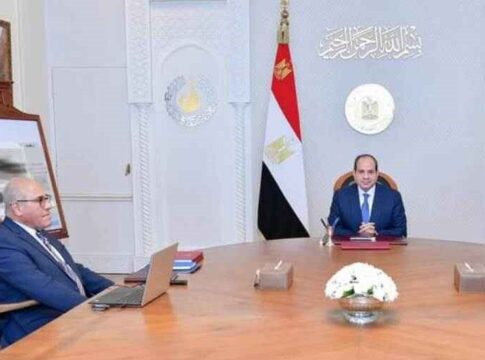President Abdel Fattah El-Sisi met this week with Major General Mokhtar Abdel Latif, Chairman of the Arab Organization for Industrialization (AOI), to review the latest developments in national manufacturing projects — particularly in the automotive sector.
According to a statement released by Presidency Spokesman Counselor Ahmed Fahmy, the meeting covered AOI’s industrial roadmap and its collaboration with both local and international partners aimed at increasing domestic production, reducing reliance on imports, and supporting Egypt’s broader economic resilience strategy.
President El-Sisi reaffirmed the state’s commitment to deepening domestic manufacturing and advancing industrial self-sufficiency, noting that these efforts are key to “curbing the import bill and securing foreign currency inflows through increased exports.”
A highlight of the meeting was the local production of the Citroën C4X, which El-Sisi personally inspected during the visit. The model, developed in cooperation between AOI, the Arab American Vehicles Company (AAV), and French auto giant Stellantis Group, currently includes 45% local components, a significant milestone in Egypt’s automotive localization targets.
Chairman Abdel Latif revealed that planning for the C4X began in August 2023, with initial prototypes completed by March 2025. The production plan will see 7,000 units manufactured annually, totaling 28,000 vehicles over four years.
“This marks a pivotal step forward for Egypt’s auto manufacturing ecosystem, leveraging AOI’s technical infrastructure and Stellantis’ global automotive expertise,” said Dr. Hany El Sawy, industrial policy advisor at the Egyptian Center for Economic Studies (ECES), in comments to MEO. “It’s a high-visibility example of technology transfer done right.”
It is to be noted that the AOI is also preparing to manufacture a completely new vehicle model in cooperation with Stellantis, with production scheduled to begin by late 2026. According to AOI officials, 240,000 units of the new model will be produced over a multi-year span — and Egypt will be the sole manufacturing site worldwide for this particular model.
This development positions Egypt not just as a regional assembly hub, but as a critical node in global supply chains, with exclusive production rights.
“This exclusive agreement is unprecedented in the region,” said Eng. Laila El-Khatib, an international automotive consultant and former executive at Renault-Nissan Middle East. “It signals real confidence in Egypt’s industrial capacity and opens doors for deeper export penetration into Africa, Europe, and the Gulf.”
President El-Sisi used the occasion to reiterate the state’s policy orientation toward enabling partnerships between state institutions like the AOI and private sector players — both Egyptian and foreign — as part of the National Automotive Industry Development Strategy (NAIDS).
The President directed authorities to enhance cooperation frameworks, focusing on: Raising local component ratios, Scaling up export operations and Streamlining regulatory and logistical support for industrial ventures.
As geopolitical shifts and supply chain realignments redefine the global manufacturing landscape, Egypt is strategically leveraging its location, labor market, and policy reforms to attract foreign direct investment (FDI) into heavy industry.
The AOI’s evolving role is central to this vision, with partnerships spanning defense, electronics, smart transportation, and renewable energy — now underpinned by a proactive export strategy. According to a 2024 report by the African Development Bank, Egypt is expected to become the third-largest vehicle assembler on the continent by 2028 if localization rates and export volumes continue on their current trajectory.


